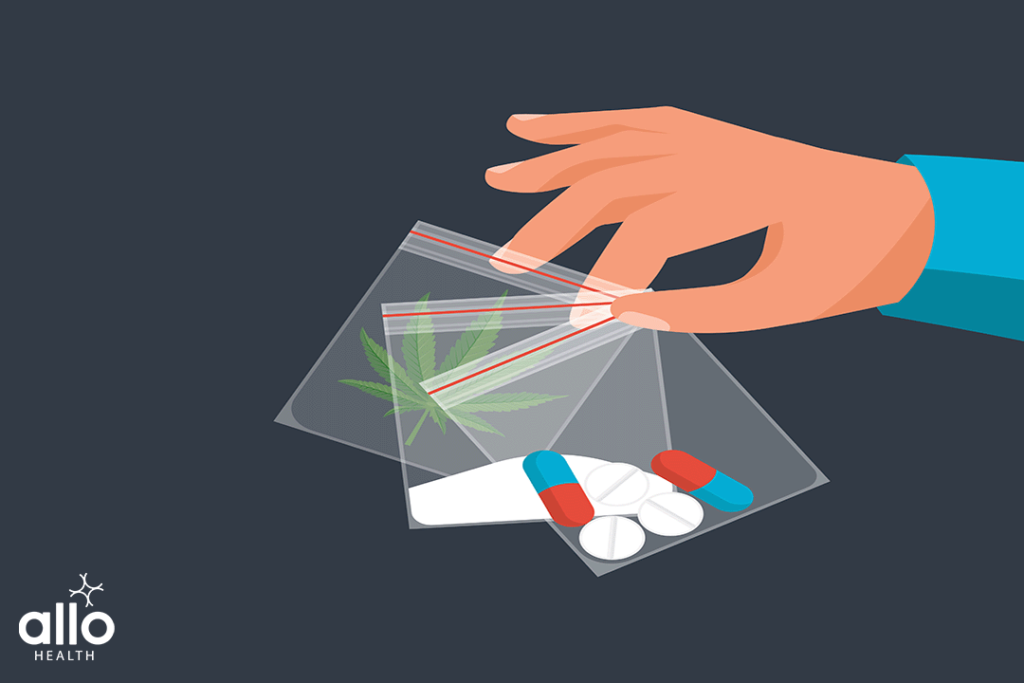Cannabis Addiction And Sexual Dysfunction

Allo Health is dedicated to personalized well-being, offering support and trusted information tailored to individual health goals. The platform emphasizes human-generated content, led by a distinguished medical team of experts, including physicians and sexual health specialists. Their commitment to credibility involves rigorous fact-checking, authoritative research, and continuous updates to ensure accurate, up-to-date information. Allo Health's unique approach goes beyond conventional platforms, providing expert-led insights and a continuous commitment to excellence, with user feedback playing a crucial role in shaping the platform's authoritative voice.

An early career psychiatrist with extensive experience in general adult psychiatry, relationship issues, psychosexual problems & special interest in sexual medicine, disorders with addictive behaviours and Obsessive Compulsive disorders. He is an astute physician with excellent academic record and research experience. He is also a member of World Health Organisation and World Psychiatric Association. His vision and goal for Allo is an inclusive, accessible digital health clinic for psychosexual difficulties.
Why This Was Upated?
Our experts continually monitor the health and wellness space, and we update our articles when new information became available.
Updated on 05 June, 2024
- Article was updated as part of our commitment to diversity, equity, and inclusion.

"The following blog article provides general information and insights on various topics. However, it is important to note that the information presented is not intended as professional advice in any specific field or area. The content of this blog is for general educational and informational purposes only.
Book consultation
The content should not be interpreted as endorsement, recommendation, or guarantee of any product, service, or information mentioned. Readers are solely responsible for the decisions and actions they take based on the information provided in this blog. It is essential to exercise individual judgment, critical thinking, and personal responsibility when applying or implementing any information or suggestions discussed in the blog."
What Is Cannabis?
Cannabis, also known as marijuana or weed, is a plant that is commonly used for its psychoactive effects. The plant is native to Central and South Asia and has been cultivated for thousands of years for its medicinal and recreational properties.
The main psychoactive component of cannabis is tetrahydrocannabinol (THC), which is responsible for the “high” that users experience. However, the plant also contains other compounds, such as cannabidiol (CBD), which has been found to have a number of therapeutic benefits.
Weed is used for a wide range of purposes, including as a recreational drug, as a medicine, and as a source of fiber and oil. In recent years, there has been a growing movement to legalize the use of cannabis for both medical and recreational purposes.
There are a number of different ways to consume weed, including smoking, vaporizing, and consuming edibles. Each method of consumption has its own unique set of benefits and drawbacks, and it is important to consider the effects of each method before choosing the one that is right for you.
Medical marijuana is used to treat a wide range of conditions, including chronic pain, multiple sclerosis, and cancer. It has been shown to be effective in reducing symptoms and improving the quality of life for many patients.
Despite the growing acceptance of cannabis, it is still illegal in many parts of the world and can have serious legal consequences for those who possess or use it. If you are considering using marijuana, it is important to be aware of the laws and regulations in your area and to use the drug responsibly.
Can Cannabis Addiction Cause Sexual Dysfunction?
While marijuana is often used recreationally, it is also commonly used for medical purposes. However, like any drug, marijuana can also have negative side effects, including addiction and sexual dysfunction.
Cannabis addiction is a real and serious condition that affects many people. It is characterized by a compulsive need to use the drug despite negative consequences. This can lead to concerns with relationships, work, and overall health.
One of the potential side effects of cannabis addiction is sexual dysfunction. Studies have shown that heavy marijuana use can lower libido, cause erectile dysfunction, and make it difficult for people to reach orgasm. This is thought to be due to the drug’s effects on the endocannabinoid system, which plays a role in regulating sexual function.
The exact mechanisms by which marijuana causes sexual dysfunction are not fully understood. However, it is known that the drug can affect the levels of certain hormones, such as testosterone and estrogen, which can lead to sexual dysfunction. Additionally, the drug’s effects on the brain may also play a role in causing sexual concerns.
Risk Factors
Cannabis, also known as marijuana or weed, is a popular recreational drug that is legal in some states and countries, but illegal in others. While it is generally considered to be less harmful than other drugs, such as alcohol and tobacco, there is still a risk of addiction associated with marijuana use.
Genetics
Studies have shown that genetics can play a significant role in the development of addiction. Individuals with a family history of addiction are more likely to develop an addiction to marijuana or other substances.
Age of first use
The earlier an individual starts using marijuana, the greater the risk of addiction. This is because the brain is still developing during adolescence and early adulthood, and cannabis use can disrupt this development and increase the risk of addiction.
Frequency of use
The more frequently an individual uses marijuana, the greater the risk of addiction. This is because the brain becomes accustomed to the drug and requires more of it to achieve the same effects.
Method of use
Smoking or vaporizing cannabis can increase the risk of addiction, as it results in a faster onset of effects and a stronger “high”.
Co-occurring mental health disorder
Individuals with mental health disorders such as anxiety, depression, or PTSD are more likely to develop an addiction to cannabis. This is because they may use marijuana as a way to self-medicate and relieve symptoms of their mental health disorder.
Stress
People under high levels of stress may turn to cannabis as a way to cope with their stress and relax. Over time, cannabis use can become more frequent and lead to addiction.
How Does Cannabis Affect The Body?
Cannabis, also known as marijuana or weed, is a plant that has been used for its medicinal and recreational properties for centuries. The active ingredients in cannabis, known as cannabinoids, interact with the body’s endocannabinoid system, which plays a role in regulating various bodily functions.
When marijuana is consumed, the most well-known cannabinoid, tetrahydrocannabinol (THC), binds to receptors in the brain and central nervous system, resulting in the “high” or euphoria associated with marijuana use. THC also has analgesic (pain-relieving) properties, which is why it is often used to treat chronic pain and other conditions such as multiple sclerosis and cancer.
Cannabidiol (CBD) is another major cannabinoid found in cannabis. Unlike THC, CBD does not produce a high and has been shown to have anti-inflammatory, anti-anxiety, and anti-seizure properties. CBD is often used to treat conditions such as anxiety, depression, and PTSD.
Cannabis use can also affect other bodily systems. For example, it can increase heart rate and blood pressure, which may be dangerous for people with heart conditions. Long-term use has also been linked to respiratory concerns, such as bronchitis and lung infections. Additionally, smoking or vaporizing cannabis can release harmful chemicals that may lead to cancer.
Sexual Disorders
One of the lesser-known effects of cannabis addiction is the potential for sexual dysfunction, including a reduced libido, difficulty achieving and maintaining an erection, and difficulty reaching orgasm.
Marijuana affects the body’s endocannabinoid system, which plays a role in regulating sexual function. The psychoactive component of cannabis, tetrahydrocannabinol (THC), has been shown to disrupt the balance of hormones that play a role in sexual function, leading to decreased libido and other sexual disorders. Additionally, cannabis use can lead to anxiety, depression, and other mental health concerns, which can also negatively impact sexual function.
One of the most common sexual disorders associated with cannabis addiction is erectile dysfunction (ED). Studies have shown that men who use cannabis regularly have a higher risk of ED, and that the risk increases with the frequency and duration of use. Marijuana use can also lead to decreased sperm count and mobility, which can affect fertility.
Women who use cannabis may also experience sexual disorders, including decreased libido and difficulty achieving orgasm. Cannabis use can disrupt the balance of hormones, leading to changes in menstrual cycle and other physical symptoms. Some studies have also suggested that cannabis use may increase the risk of cervical cancer in women.
Mental Health Disorders
Depression
Studies have shown that regular Marijuana use can increase the risk of developing depression, particularly in individuals who have a predisposition to the condition. Cannabis can also worsen symptoms in those who already have depression
Anxiety
It can cause feelings of paranoia and panic, which can lead to long-term anxiety disorders. It can also make existing anxiety disorders worse.
Memory Loss
An addiction can also lead to cognitive disorders such as memory loss and attention deficits. These disorders can have a significant impact on a person’s ability to function in their daily life, including at school or work.
Psychosis
An addiction can also lead to psychosis, which is a severe mental health disorder characterized by hallucinations, delusions, and disordered thinking. Individuals with a family history of psychosis or other mental health disorders are at a higher risk of developing psychosis as a result of cannabis addiction.
It’s important to note that not everyone who uses cannabis will develop a mental health disorder, but the risk increases with prolonged and excessive use. If you or a loved one is struggling with cannabis addiction, it’s important to seek professional help. Treatment options include therapy, counseling, and support groups, which can help individuals manage their addiction and reduce their risk of developing mental health disorders.
Major Organs & Systems Negatively Affected
Cannabis addiction can negatively affect several major organs and systems in the body, including:
- The lungs: It’s smoke contains many of the same harmful chemicals found in tobacco smoke, which can lead to lung irritation and respiratory concerns such as chronic bronchitis.
- The brain: Use can lead to addiction, and heavy use has been linked to mental health concerns such as anxiety, depression, and psychosis.
- The heart: Increase heart rate, which can be a concern for people with heart conditions.
- The immune system: Weaken the immune system, making a person more susceptible to infection.
- The reproductive system: Reduce sperm count in men and disrupt ovulation in women.











































